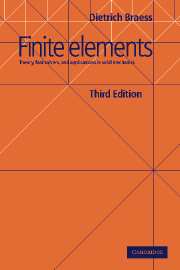Book contents
- Frontmatter
- Contents
- Preface to the Third English Edition
- Preface to the First English Edition
- Preface to the German Edition
- Notation
- Chapter I Introduction
- Chapter II Conforming Finite Elements
- Chapter III Nonconforming and Other Methods
- Chapter IV The Conjugate Gradient Method
- Chapter V Multigrid Methods
- Chapter VI Finite Elements in Solid Mechanics
- References
- Index
Preface to the Third English Edition
Published online by Cambridge University Press: 01 March 2010
- Frontmatter
- Contents
- Preface to the Third English Edition
- Preface to the First English Edition
- Preface to the German Edition
- Notation
- Chapter I Introduction
- Chapter II Conforming Finite Elements
- Chapter III Nonconforming and Other Methods
- Chapter IV The Conjugate Gradient Method
- Chapter V Multigrid Methods
- Chapter VI Finite Elements in Solid Mechanics
- References
- Index
Summary
The theory of finite elements and their applications is such a lively area that a third edition has become necessary to cover new material that is of interest for actual applications. At the same time we have taken the opportunity to correct some misprints.
The greatest changes are found in Chapter III. Saddle point problems and mixed methods are used now not only for variational problems with given constraints, but there is also an increasing interest in nonstandard saddle point methods. Their flexibility enables the construction of finite elements with special properties, e.g. they can soften specific terms of the energy functional in order to eliminate locking phenomena. The treatment of the Poisson equation in the setting of saddle point formulations can be regarded as a template for other examples and some of these are covered in the present edition.
Another nonstandard application is the construction of a new type of a posteriori error estimate for conforming elements. This has the advantage that there is no generic constant in the main term. Moreover, in this framework it is possible to shed light on other relations between conforming elements and mixed methods.
In Chapter VI the treatment of locking has been reworked. Such phenomena are well known to engineers, but the mathematical proof of locking is often more cumbersome than the remedy. In most cases we focus therefore on the use of appropriate finite elements and describe the negative results more briefly within the context of the general theory of locking.
Information
- Type
- Chapter
- Information
- Finite ElementsTheory, Fast Solvers, and Applications in Solid Mechanics, pp. xPublisher: Cambridge University PressPrint publication year: 2007
